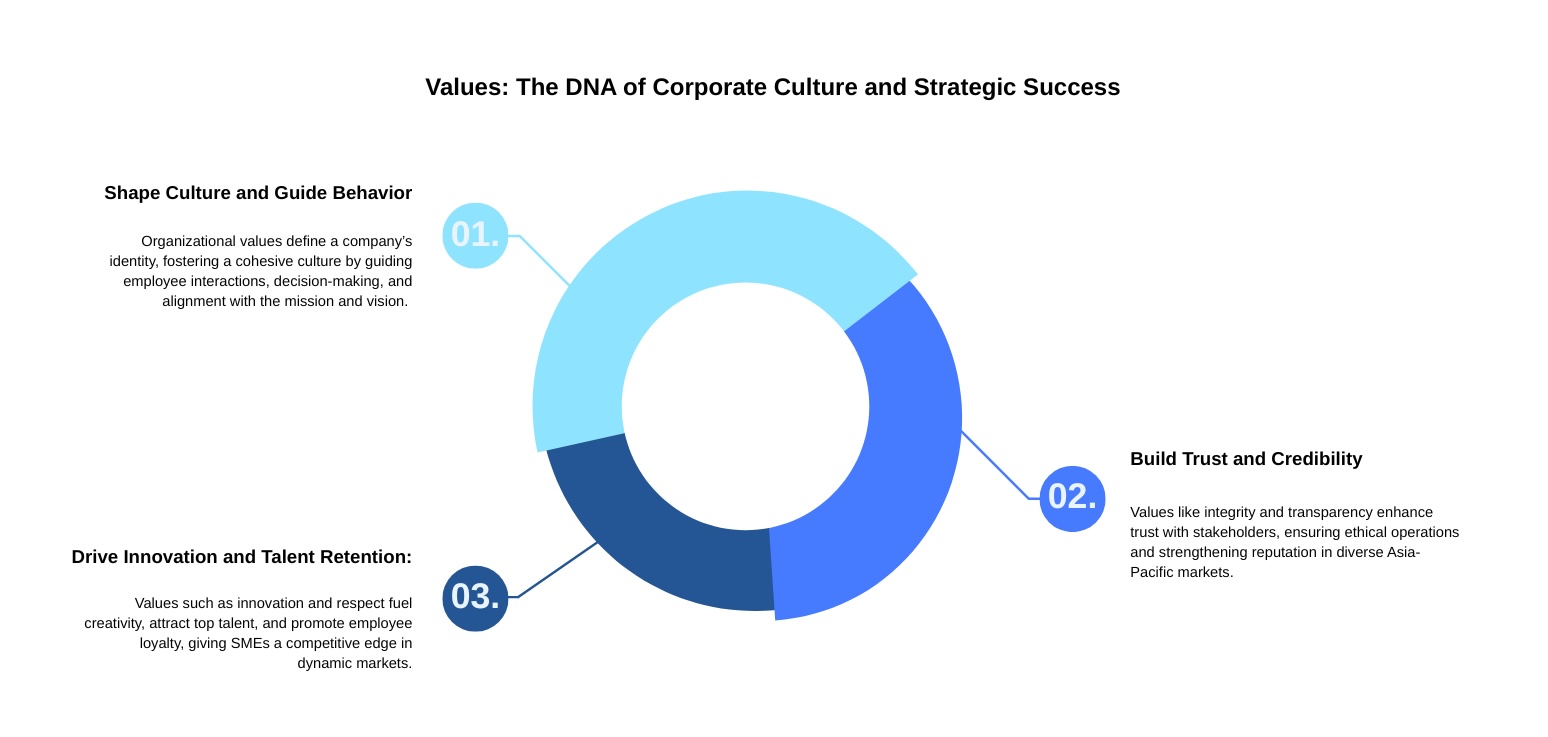

DNA is the blueprint of life, encoding the essential information needed for growth and function. Values act as this DNA in a business context, providing the fundamental principles that guide strategy, shape culture, and drive decision-making. Like DNA, core values ensure an organization remains aligned with its Vision and Mission, fostering a cohesive and resilient enterprise.
This blog looks at how organizational values in SMEs influence strategy development and execution within and across the business.
Value are the core principles that guide an organization's behaviour, shape its culture, and drive decision-making.
Organizational values are the guiding principles that define a company's culture, decision-making processes, and overall operational framework. They are not just words on a wall or a mission statement; values steer a company toward its goals. They provide ethical and operational guidelines that permeate all activities and shape how the Vision and mission are pursued.
Examples of Organizational Values:
Corporate governance standards require that businesses operate ethically. In an era of increasingly critical ethical considerations, customers and employees are more inclined to support companies that demonstrate a steadfast commitment to strong value-based principles. Trust is a vital currency for SMEs and startups in Asia-Pacific, where markets are diverse and culturally nuanced.
For instance, a company that claims to prioritize sustainability but fails to implement eco-friendly practices risks losing credibility with customers and employees (Engagedly, 2023). Values like integrity, transparency, and respect build trust and ensure that all stakeholders—employees, customers, and partners—are aligned with the company's vision.
Organizational values act as a decision-making framework, ensuring consistency and alignment with long-term objectives. For example, SMEs in Asia-Pacific operating across multiple markets often face complex decisions involving cultural sensitivities, regulatory compliance, and market-specific challenges. Values such as collaboration and innovation can guide these decisions, ensuring they are profitable but also ethical and sustainable (Engagedly, 2023).
A company's commitment to values like collaboration and respect significantly influences its ability to attract and retain top-tier Talent. In Asia-Pacific, where talent competition is fierce, particularly in tech hubs like Singapore, Bangalore, and Tokyo, a strong value-driven culture can be a differentiator. Employees are likelier to stay with companies that align with their values and provide a positive work environment (Corvus People, 2024).
Asia-Pacific is a region of immense diversity, encompassing various cultures, languages, and economic conditions. For SMEs in this region, organizational values must be adaptable yet consistent to navigate these complexities effectively.
SMEs in Asia-Pacific often operate in multiple markets, each with its cultural norms and expectations. Organizational values must reflect this diversity while maintaining a consistent core. For example, a value like "respect" can manifest differently in Japan, where hierarchical respect is emphasized, compared to Australia, where egalitarianism is valued (Asamby Consulting, 2022).
Asia-Pacific is home to some of the world's leading startup ecosystems, such as Singapore, Shenzhen, and Bangalore. For startups in these regions, values like innovation and agility are crucial. These values encourage unconventional thinking and responsiveness to market changes, essential for developing unique products and services (StartupBlink, 2025).
Sustainability is becoming a key focus for Asia-Pacific businesses, driven by regulatory pressures and consumer demand. SMEs prioritizing values like environmental stewardship and social responsibility can differentiate themselves in the market. For instance, Vietnam's commitment to funding R&D projects in the semiconductor and AI sectors highlights the growing importance of innovation and sustainability in the region (Startup Researcher, 2025).
One of the biggest challenges for SMEs and startups is ensuring their espoused values align with their actions. Misalignment can lead to a loss of trust and credibility. To address this, leadership must demonstrate a genuine commitment to values through consistent communication and integration into performance management and key business metrics (Corvus People, 2024).
Values must be more than just statements; they must be embedded in daily operations. This requires training and development, clear communication, and regular reinforcement. For example, SMEs can use use case or competitive benchmarking to illustrate how values are applied in real-world scenarios and competitors (Asamby Consulting, 2022).
Market conditions can change rapidly in a region like Asia-Pacific. SMEs and startups must ensure their values are flexible enough to adapt to these changes without losing their essence. This requires regular reviews and updates, and approaching market conditions with agility to ensure values remain aligned with purpose (Startup Researcher, 2025).
Organizational values are the DNA of corporate culture, shaping how SMEs and startups in Asia-Pacific operate, make decisions, and interact with stakeholders. For SMEs across multiple markets, values provide a unifying framework that ensures consistency while allowing for cultural sensitivity. For startups, values are a strategic asset that drives innovation, fosters employee engagement, and ensures sustainable growth.
In a region as diverse and dynamic as Asia-Pacific, the careful cultivation and alignment of organizational values are not just important—they are essential for long-term success. By embedding values into operational culture, SMEs and startups can build trust, drive innovation, and confidently navigate the region's complexities.
